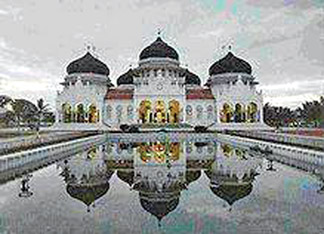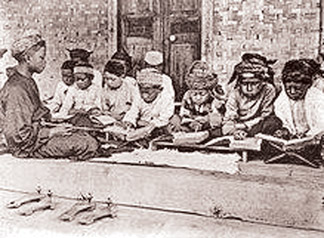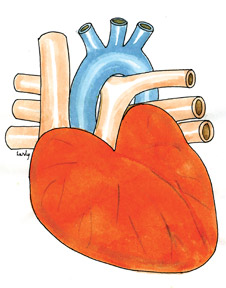|
ISLAM
Indonesia, the largest Muslim population
No Muslim army ever invaded distant Indonesia. No organized Muslim
missionaries propagated Islam there. However this archipelago nation has
the largest Muslim population in the world.
|

Banda Aceh’s Grand Mosque |
In the year 651 AD Caliph Uthman ibn Affan sent a delegation to China
to introduce Islam. On the way the messengers of Uthman apparently
stopped in Indonesian archipelago. This was the first time Indonesian
people came to know Islam. Since, then Muslim seaman and merchants kept
visiting Indonesia for centuries. They introduced Islam while bringing
agricultural produce from this country known for its lush green fields
and forests.
Gradually, the indigenous people started to embrace Islam though not
on a large-scale. Aceh, the most west region in Indonesia archipelago
was the first region to embrace Islam. Moreover, in Ache, the first
Islamic kingdom was established. Famous traveller Marco Polo said that,
when he reached Pasai in 1292, many Arabic people had already introduced
Islam. Ibnu Battutha, Moroccan traveller too had stated about the
presence of Muslims when he landed there.
Evidence
Some categorize the Muslim community in terms of two orientations:
“modernists,” who closely adhere to orthodox theology while embracing
modern learning; and “traditionalists,” who tend to follow the
interpretations of local religious leaders (predominantly in Java) and
religious teachers at Islamic boarding schools.
There is evidence of Arab Muslim traders entering Indonesia as early
as the eighth century. Indonesia’s early people were animists, Hindus
and Buddhists. However it was not until the end of the 13th century that
the process of “Islamization” began to spread throughout the areas and
port towns. This process of spreading Islam continued to saturate among
the Indonesian people though local rulers and royalty began to adopt the
religion. Subsequently their subjects would mirror their conversion.
This process was given a shot in the arm as Muslim traders married
the local women, with some of the wealthier traders marrying into the
families of the ruling elite.
However by the end of the 13th century, Islam had been established in
North Sumatra; by the fourteenth in northeast Malaya, Brunei, the
southwestern Philippines and among some courtiers of East Java; and the
fifteenth in Malacca and other areas of the Malay Peninsula.
In the late 15th century, the powerful Majapahit Empire in Java was
at its decline. After it had been defeated in several battles, the last
Hindu kingdom in Java fell under the rising power of the Islamized
Sultanate of Demak in 1520. Islam in Java then began to spread formally,
largely influenced by the Wali Songo (or the Nine Saints).
The Dutch colonized the region in the 17th century due to its
lucrative wealth established through the regions’ natural resources and
trade. Indonesia was then known as the “spice islands”. The countries
natural spices, including nutmeg, pepper, clove, sandal wood, rubber and
teak, were highly prized.
Although the colonization of Indonesia resulted in a monopoly of the
central trading ports, through closed trading ports, this, ironically,
resulted in the spread of Islam, as the local Muslim traders relocated
to the smaller more remote ports, started establishing Islam into the
more rural provinces of the region.
European Colonial Powers
Towards the beginning of the 20th century “Islam became a rallying
banner to resist colonialism”.
There was a move, inspired by the Islamic scholar, Muhammad ‘Abduh,
to return to the original scripture of the religion. The movement “built
schools that combined Islamic and secular curriculum” and trained women
as preachers for women.
When Indonesia declared independence in 1945, it became the second
largest Muslim-majority nation in the world. However following the
separation of Bangladesh from Pakistan in 1971, Indonesia emerged as the
most populous Muslim country in the world.
Today it has about 88 percent of the population of 235 million
following Islam.
|

Children studying Koran in Java during Dutch colonial period. |
In recent years there has been a trend toward a more orthodox
interpretation of Islam.
Upon independence there was significant controversy surrounding the
role of Islam in politics; this caused enormous tensions. Eventually,
“Indonesia adopted a civil code instead of an Islamic one.
Under the Suharto regime Islamic organizations were brutally
repressed. Under this policy all Islamic parties were forced to unite
under one government-supervised Islamic party. With the removal of
Suharto in 1998, “the structure that repressed religion and society
collapsed. Currently “Muslims are now fully represented in the
democratically elected parliament”.
The Indonesian Constitution provides “all persons the right to
worship according to their own religion or belief” and states that “the
nation is based upon belief in one supreme God.”
The government generally respects these provisions; however, some
restrictions exist on certain types of religious activity and on
unrecognized religions.
The Religious Affairs Ministry extends official status to six faiths:
Islam, Catholicism, Protestantism, Buddhism, Hinduism and Confucianism.
Importance of seeking knowledge
“Allah will exalt those who believe among you and those who have been
granted knowledge to high ranks.” (Qur’an).”Seeking knowledge is
obligatory upon every Muslim (male and female).” (Hadith)
If Muslims truly realise the importance Islam places on knowledge and
its virtues, they will definitely be keen to learn and teach others.
They would start with themselves and their families; then their
neighbours and the community at large. Once Mu’awiyah Ibn Abi Sufyan
said, “I heard Allah’s Messenger saying, “If Allah wants to do good to a
person, he makes him very knowledgeable in the Deen.” (Related by
Bukhari and Muslim).
|

Seeking knowledge is obligatory upon every Muslim |
This is because knowledge is the basis of all good; it generates
actions that are based on the commandments of Allah and the instructions
of the Prophet (PBUH). Hence, every Muslim must instil in his mind a
desire to seek knowledge. Allah instructed His Prophet and thus all
Muslims to ask Allah to increase him in knowledge.
Though, initially, all Muslims are equal in the sight of Allah, those
who believe, have fear of Allah and righteousness, and have been granted
knowledge move up to higher ranks. Allah says about those who have
piety: “Verily the most honoured of you in the sight of Allah is he who
has most piety.” (Qur’an, Al-Hujurat 49:13)
And He said about those who believed and acquired knowledge: “Allah
will raise up, to (suitable) ranks and (degrees), those of you who
believe and who have been granted knowledge. And Allah is
well-acquainted with all you do.” (Qur’an, Al-Mujadilah 58:11)
When a servant of Allah is granted knowledge, he appreciates Allah’s
creation more, and becomes more acquainted with Allah’s attributes and
qualities. Consequently, he wholeheartedly witnesses that his Creator is
the only one worthy of worship, and then submits to Him humbly.
This, in return, generates in his heart a fear, which is akin to a
full appreciation and love of His Lord. Allah has witnessed in favour of
His learned servants these qualities, full appreciation of His Oneness
and fear of Him.
The Messenger of Allah gave glad tidings to anyone who undertakes the
task of seeking knowledge. Abu Hurayrah relates that the Prophet said,
“For him who embarks on the path of seeking knowledge, Allah will ease
for him the way to paradise.” (Related by Muslim) If no Hadith on the
importance of knowledge besides this one had been uttered by the
Prophet, it would have been enough for Muslims. Yet the Prophet did more
than that:
He used to stimulate his companions to seek knowledge: Ibn Mas’ud
relates that the Prophet said, “Only two persons are worthy of being
envied; a person upon whom Allah bestows riches and gives him the power
to spend it in a righteous cause; and a person upon whom Allah bestows
wisdom by which he judges and which he teaches.” (Related by Bukhari and
Muslim).
He used to congratulate the companions whenever they issued a right
judgment or correctly answered a question. Imam Muslim narrates that
once the Prophet asked Ubayy Ibn Ka’b, “Do you know which verse in
Allah’s Book is the greatest?” Ubayy answered by reciting Ayat-ul-Kursi
(the verse of the Throne, i.e. Al-Baqarah, 2:255): “Allah! None has the
right to be worshiped but He, the Ever Living, the One Who sustains and
protects all that exists...) The Messenger kindly patted him on the
chest, saying, “Congratulations, Abul-Munthir for this knowledge”.
He ordained all his companions and, thus, every Muslim who possesses
some knowledge even as little as one verse to disseminate what they know
to others: He said, “Convey (what you learn from me) even if only one
verse...” (Related by Bukhari)
He made special supplication for those who learn his sayings and
transmit them to others: Zayd Ibn Thabit narrated that the Prophet said,
“May Allah brighten the face of the person who hears what I say and
retains it, then conveys it to others: for sometimes one who hears from
another remembers it better than the original hearer himself.” (Related
by Ahmad and Tirmithi)
He assured all those who disseminate his knowledge that they will get
the same reward of any Muslim who acts upon that knowledge: Abu Hurayrah
relates that the Prophet said, “He who calls another to guidance will
have a reward equal; to the reward of him who follows him without
diminishing the reward of either of them.” (Related by Muslim)
He showed to us the noble status of the learned people: Abu Umamah
relates that the Prophet said, “A learned one is as much above an
(ordinary) worshipper as I am above the least of you; and he added:
Allah, His angels and all those in the heavens and in the earth, even
the ants in their holes and the fish in the water, call down blessings
on those who instruct people in beneficent knowledge.” (Related by
Tirmithi)
After reading all these promises and glad tidings, one might ask,
what more do we need to awaken our consciousness? We have been promised
an easy way to paradise.
Courtesy- free encyclopedia.
Recap of ‘Heart matters’
The Prophet Muhammad (PBUH) constantly emphasized the importance of
good health. He knew that healthy bodies carry health souls. This shows
the importance Islam places on spiritual and physical
strength....talking about the heart this is such a vital organ. The
heart is about the size of a clenched fist and beats an average 100, 000
times every 24 hours, pumping around five liters of blood every
minute.....this is quite a job it does!

We cannot live without our heart. However, when you get right down to
it, the heart is just a pump. A complex and important one, yes, but
still just a pump. As with all other pumps it can become clogged, break
down and need repair......that’s why it’s so important that we take good
care of this pump that Allah has blessed us with.
Islam places great importance on the heart and its well-being. The
Prophet PBUH said: “Truly there is a morsel of flesh within the body,
which if it be whole then the whole body will be whole and if it be
diseased then the whole body will be diseased, verily this is the
heart.”
Looking after our heart is vital to living a good and healthy
life.......the term heart disease covers a number of conditions
affecting our heart. The most common problem is coronary heart disease.
There are some risk factors for heart disease that you can do nothing
about, such as your age. As you get older your arteries naturally become
less elastic, increasing the risk of high blood pressure. You’re also
more at risk if you have a family history of CHD, diabetes or high
cholesterol.
There are numerous risk factors that you can control - making some
changes to your lifestyle can help to reduce your risk of heart
disease....... Taking regular exercise is one of the best things one can
do for heart. Being physically active also helps to maintain a healthy
weight. This is because exercise burns calories and increases resting
metabolic rate.
Moderate-intensity physical activity makes you feel warm and slightly
out of breath, but you can still talk. It helps your heart to become
stronger, so that it can pump more blood around your body with less
effort. You can benefit from physical activity at any age. Find
activities you enjoy and can do safely and conveniently.....there are
many options, such as brisk walking, cycling, swimming or going to the
gym.
Your activity doesn’t have to be a sport - gardening, taking the
stairs instead of the lift and walking instead of driving can all count
towards your 30-minute goal. The more exercise you do, the more you can
reduce your risk of heart disease.
A healthy diet can help prevent heart disease. Aim for a balanced
diet, basing your meals on starchy foods with some dairy and non-dairy
sources of protein, and plenty of fruit and vegetables. Limit the amount
of salt, sugar and fat in your diet. Choose healthy cooking methods
(grill, bake, steam or microwave instead of frying), trim fat off meat
and remove skin from chicken. Eating more fish may help to reduce your
intake of saturated fat.
Stress can have a real impact on your heart health and unfortunately,
the way some of us cope with stress such as eating unhealthy foods, can
also affect heart health.....when some people are stressed they throw in
all the junk they can find and don’t care about the side effects.
Research suggests a moderate amount of pressure can help us keep
alert and motivated and allow us to perform better. However, too much
pressure for too long can lead to stress. Learning to relax and control
your stress will help you enjoy your life more and be better for your
heart health in the long run.
Also factors such as smoking contribute to heart disease....cigarette
smoking is a major factor in the development of many cases of cancer,
heart trouble, chronic lung and respiratory disease and other ailments.
Smoking causes more illness and death than all other drugs and a
Muslim should stay away from anything that causes harm to the body as
Allah tells us: “0 ye who believe! Intoxicants and gambling are an
abomination of Satan’s handiwork. Eschew such abominations that ye may
prosper.” (5:93 )
Smoking intoxicates the person after all it is a drug that is very
addictive......it is nothing but a form of slow suicide and to this we
are told:”And make not your own hands contribute to your destruction.” (
2:195).
“Nor kill or destroy yourselves for verily God hath been to you most
Merciful.”( 4:29) Scientists have proven that smoking doubles your risk
of having a heart attack and doubles, triples, or quadruples your risk
of sudden cardiac death......Passive smoking (inhaling smoke from nearby
smokers) may also increase your risk of heart disease - you should try
to prevent your exposure to this.
“No calamity befalleth save by Allah’s leave. And whosoever believeth
in Allah, He guideth his heart. And Allah is Knower of all things.”
Surah at-Taghbun(64):11 |



